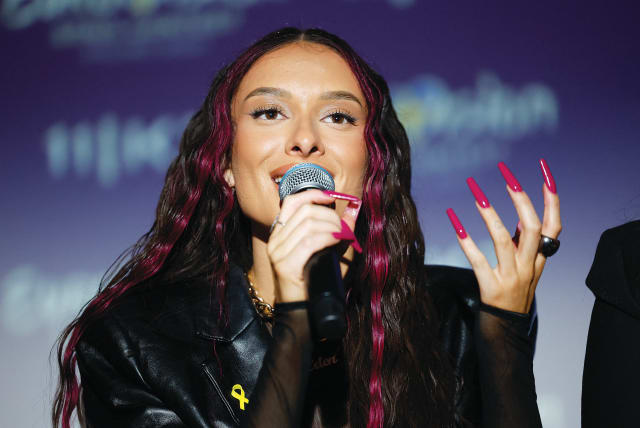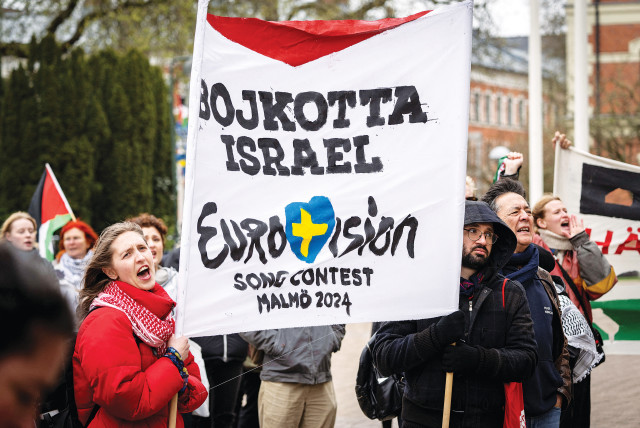Eden Golan to face a ‘hurricane’ of possible antisemitism in Malmo

The international song contest will be held this year in Malmo, Sweden, considered to be one of the most antisemitic cities in the world, making Israel's participation more complicated.
The Eurovision 2024 slogan is “United by Music,” but Israeli Eurovision fans fear that the true slogan this year may be “United by Hate and Antisemitism.”
It was never going to be easy for Eden Golan, Israel’s contestant, to compete in Eurovision in 2024 during the war with Hamas, but the fact that the international song contest will be held this year in Malmo, Sweden, considered to be one of the most antisemitic cities in the world, has made it infinitely more complicated and dangerous for Israel to take part.
The war would have affected Israel’s participation in any city, but last year, when Sweden’s Loreen won the competition with her song, “Tattoo,” it guaranteed that the competition would move to Malmo, since the contest is held in the home country of the previous year’s winner.
A city known for antisemitic threats and harassment
Malmo, Sweden’s third largest city, is a port city connected by the Oresund Bridge to Copenhagen, but its location, unfortunately does not ensure that it is cosmopolitan or tolerant. Malmo has a population of a little over 350,000 and there are about 100,000 Muslims in the region. In recent years, the small Jewish community in the city has reported serious antisemitic threats and harassment from Malmo’s Muslim residents.
Israeli Eurovision contestants have always performed under heavy security, but according to multiple media reports, security measures have been heightened greatly in advance of this year’s contest, which will open on May 7.
Golan is set to perform in the semi-final on May 9. She and the entire Israeli delegation – consisting of her dancers, musicians, stylists, and others – is said to have been told by the Shin Bet, Israel’s security service, to stay in their Malmo hotel rooms at all times, except when Golan is actually performing.
While Israelis have always needed security, past Israeli delegations to Eurovision contests have had at least some opportunity to mingle with the other delegations and enjoy the cities in which the contest has been held, an important part of participating in an international competition. But this year, the focus will be on keeping them safe to the exclusion of everything else in the wake of anti-war protests and threats.
A recent report by Keshet 12 News correspondents Ohad Hemo and Elad Simchayoff on Malmo revealed a disturbing level of antisemitism among the Muslim population of the city. The reporters and their crew were threatened, assaulted, and spit on many times by Muslim residents of Malmo who heard them speaking Hebrew. Being filmed did not deter these harassers.
One Jewish resident of an upscale Malmo neighborhood told the Keshet correspondents that she was alerted to the Hamas attack on the morning of October 7 by hearing cheers from the street that were so loud that they woke her. Yair Elsner, also a Jewish Malmo resident, told them that in the first weeks after October 7, he would walk from his building to his car carrying a knife to protect himself.
“You go outside and you see exactly the same people who did October 7, but here. There is no difference – there is no reason to assume that they wouldn’t be able to commit the same atrocities on us here if only they could,” he told them.
Keshet reported that seven out of 10 Swedish Jews testified in a recent survey that their lives had become more difficult following October 7 and about half of them said they had considered or were considering leaving the country.
Perhaps the most chilling aspect of their report was that guards at a Malmo mosque, who did not realize that the Keshet correspondents were Jewish, told them that they had heard there would be a bomb attack at Eurovision and that everyone they knew was going to stay away from Malmo Arena, where the contest will take place.
UNFORTUNATELY, antisemitism in Malmo is nothing new. Fourteen years ago, the Simon Wiesenthal Center issued a travel warning for Jews to southern Sweden and especially to Malmo. In 2015, a Swedish journalist walked around the city wearing a kippah and a Star of David had to stop filming earlier than planned because so many people threatened him, cursed him, and threw eggs at him.
In 2016, Danish Jewish actor Kim Bodnia quit the hit detective series, The Bridge, which was filmed in Malmo and Copenhagen, saying in an interview, “It’s not very comfortable to be [in Malmo] as a Jewish person.”
It isn’t only antisemitism that is on the rise in Sweden, but lawlessness in general. According to reports, in 2022, in Stockholm, the number of gun murders was 30 times higher than that of London. “These are difficult times for Sweden,” Olaf Kristersson, the prime minister said. “Sweden has never seen anything like this before – no other country in Europe has seen anything like this.”While Sweden may have the reputation of being a clean, prosperous country with great social services such as health care and a high standard of living, in recent years, it has been coping with an epidemic of drug gang violence that includes bomb and grenade attacks.
In an article headlined, “Sweden’s new normal: Bombs in the suburbs on a weeknight” in Politico, Charles Duxbury wrote in early October 2023: “The upswell of [gang] violence has been so intense, widespread, and chaotically executed – inexperienced teenage boys are often recruited to carry out the attacks – that there is a growing sense here that no one is safe from it.”
According to The Guardian, in 2023 there were 149 successful bomb detonations and 62 attempted bombings in Sweden, in a country with a total population of about 10.5 million people.
THE LAWLESSNESS and antisemitism have combined to give Israeli security the challenge of a lifetime, while the delegation will also have to cope with hostility from other Eurovision contestants. Some artists have called for Israel to be banned from Eurovision, as Russia was following its invasion of Ukraine, but the European Broadcasting Union (EBU), which runs Eurovision, has reiterated its stance that it is a contest for broadcasters, not governments, and that Israel’s Kan broadcaster has done nothing wrong.
Yet, despite the threat level, Eden Golan’s song, “Hurricane” has consistently been in the top 10 in the Eurovision betting tables, considered a reliable measure of success in the contest; at presstime, “Hurricane” was in the seventh spot out of 37 countries.
Israel’s original choice for its song, “October Rain,” was rejected by the EBU. Eurovision’s policy is that songs should avoid specific political content and the song was seen as a comment on the Hamas massacre, which it unquestionably was.
The new song, “Hurricane,” made the lyrics vaguer, although the sentiment expressed is essentially the same. The music video released for the song shows Golan singing at a location that looks much like the Supernova music festival, where about 10% of the attendees were murdered and taken hostage on October 7, with dancers seemingly writhing in agony.
Israel began taking part in Eurovision in 1973, even though it is not in Europe, since it would not have been welcomed in a Middle Eastern regional song contest. It took home the top prize in 1978 and 1979 with wins for Izhar Cohen and the Alphabeta for the song “A-Ba-Ni-Bi,” and Milk and Honey for “Hallelujah,” respectively, and again in 1998 with International’s “Diva.”
In 2018, Netta Barzilai became Israel’s fourth Eurovision winner with her rousing rendition of “Toy,” and in 2023, pop star Noa Kirel came in third with her high-energy song, “Unicorn.”
Golan, the 20-year-old Israeli singer who spent much of her childhood in Russia, where she had a successful singing career, has shown great poise and determination in the face of the threats and hostility.
She told Eurovision Fun earlier this week that she had complete trust in her security detail and was excited to compete. “This is my dream coming true. Represent my country and do something big in front of the whole world!” she said.
“This year it takes on a different and greater meaning, to stand there on stage and show that we are here. We’ve been through ‘hurricanes’ to get to this, I really want to do it and I believe we’ll go to the final, but our participation is an achievement on its own, and it’s an honor.
“This year’s show is completely different from any other year and the message is that you trust me. The viewers chose me and they believe in me, which is crazy. I believe that everything happens for the best, and I have strength. All the years of preparation and working on my skills have built me up and made me strong enough for this moment.”
In the past, the glitzy production numbers, slick pop tunes, outrageous costumes, and breathless presenters have made Eurovision fun for its millions of fans around the world but this year, the theme of tolerance among nations will be tested.
Perhaps in a contest where the performer ranked second in the odds is a Croatian band called Baby Lasagna, we should keep in mind that the it’s just entertainment and that the real victory for Israel this year will be the safety and well-being of Golan and the entire Israeli delegation.
Jerusalem Post Store
`; document.getElementById("linkPremium").innerHTML = cont; var divWithLink = document.getElementById("premium-link"); if (divWithLink !== null && divWithLink !== 'undefined') { divWithLink.style.border = "solid 1px #cb0f3e"; divWithLink.style.textAlign = "center"; divWithLink.style.marginBottom = "15px"; divWithLink.style.marginTop = "15px"; divWithLink.style.width = "100%"; divWithLink.style.backgroundColor = "#122952"; divWithLink.style.color = "#ffffff"; divWithLink.style.lineHeight = "1.5"; } } (function (v, i) { });

